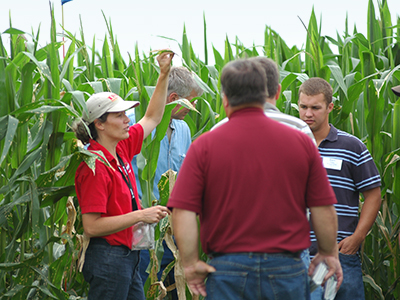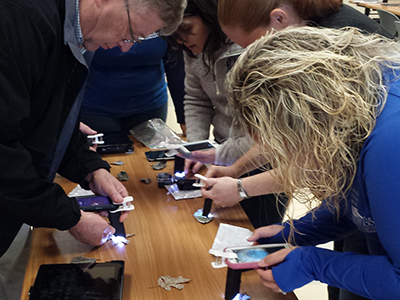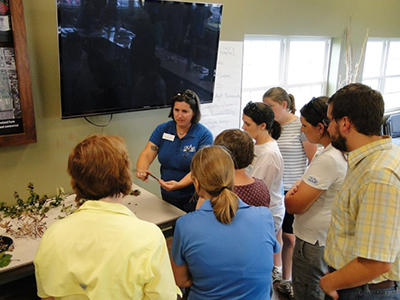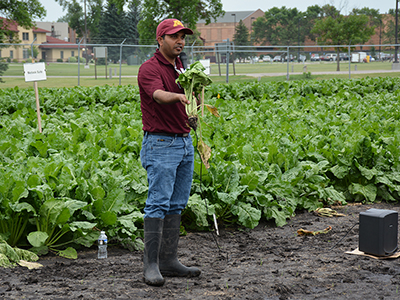 Plant Pathologists...
Plant Pathologists...
- Preserve the environment
- Help grow healthy crops
- Ensure an adequate food supply
- Maintain the beauty of ornamental plants
- Invent new ways to control plant diseases
- Have rewarding professional careers
- Enjoy lifelong learning and world travel
- Unravel the mysteries of plant disease
Students are always welcome to contact Plant Pathology Departments in your area for a tour and one-on-one introduction to some of the top scientists in the field. You might also want to check out the variety of internship opportunities that are available for a first-hand experience. Additionally, graduate student assistantships are regularly posted in the APS Job Center.

What Is a Plant Pathologist?
A plant pathologist needs an understanding of the organisms and agents that cause disease as well as an understanding of how plants grow and are affected by disease. Through college courses in botany, microbiology, crop science, soil science, ecology, genetics, biochemistry, molecular biology, and physiology, students receive the necessary background for exciting careers in plant pathology. Most take advanced college training for master's and doctoral degrees. Plant pathologists are employed by colleges/universities, state or federal government, industry, international institutes.
 Plant Pathologists Strive to Keep Plants Healthy
Plant Pathologists Strive to Keep Plants Healthy
Plant diseases are caused by a variety of living organisms such as fungi, bacteria, viruses, nematodes, phytoplasmas, protozoa, and parasitic plants, and by nonliving agents such as air pollutants, nutrient imbalances, and various environmental factors.
Examples include growing resistant plant varieties, planting pathogen-free seed or stock, applying a biological control agent, modifying environmental conditions to decrease disease, and using plant medicines that inhibit or kill the pathogen without harming the plant or the environment.
In their work, plant pathologists cooperate with plant breeders and crop management, insect, and weed specialists in developing integrated, environmentally sound approaches to managing crops and their pests.
Plant pathologists utilize modern scientific equipment and techniques to unravel the mysteries of how pathogens
attack plants and to understand the effects of environmental conditions on disease development.
Research laboratories are equipped with plant growth chambers where light and temperature can be controlled accurately, with scanning electron microscopes that provide three-dimensional images of pathogens on plant surfaces, with high-performance liquid chromatographs that provide rapid analysis of chemicals in diseased and healthy plants, and, of course, with computers for analyzing data.
Plant pathologists employed by the Cooperative Extension Service, by industry, or as private practitioners work with agricultural producers, food processors, landscape and forest managers, or other professionals involved in growing or managing plants.
 Educational Requirements for Plant Pathology
Educational Requirements for Plant Pathology
Training for a bachelor's degree at an accredited college or university is the first step toward becoming a plant pathologist. Certain employment opportunities may be enhanced by undergraduate coursework or a major in plant pathology.
Graduate work in plant pathology usually is essential to acquire sufficient knowledge of the science to obtain most professional positions. Most state universities with a college of agriculture offer advanced curricula leading to a master of science and/or a doctor of philosophy degree in plant pathology.
 Where Do Plant Pathologists Work?
Where Do Plant Pathologists Work?
The expanding interest in the quality of our global environment and increasing global demand for high-quality food, fiber, tree and ornamental plants provides many opportunities for plant pathologists. These professionals often are sought by government and nonprofit organizations and corporations to participate in teams of specialists addressing international agricultural development. Such employment may be on a continuing or a consulting basis.
Plant pathologists are employed by:
- Colleges and universities (research, teaching, and extension)
- Agricultural consulting companies
- Agrichemical companies
- Seed and plant production companies
- Tissue culture laboratories
- Diagnostic laboratories
- International agricultural research centers
- Botanical gardens and arboreta
- Biotechnology firms
- Biological control companies
- Private practice
- Nurseries and garden centers
- Public policy organizations
- Lawn and landscape maintenance firms
- USDA-Agricultural Research Service
- USDA-Forest Service
- USDA-Animal & Plant Health Inspection Service
- EPA (Environmental Protection Agency)
- State departments of agriculture
- Environmental, agricultural, and patent law firms
Listen to the Experts
Visit our Professional Development Center to learn more about launching a career in plant pathology or check out this video with additional highlights on where a career in plant pathology migh take you...
